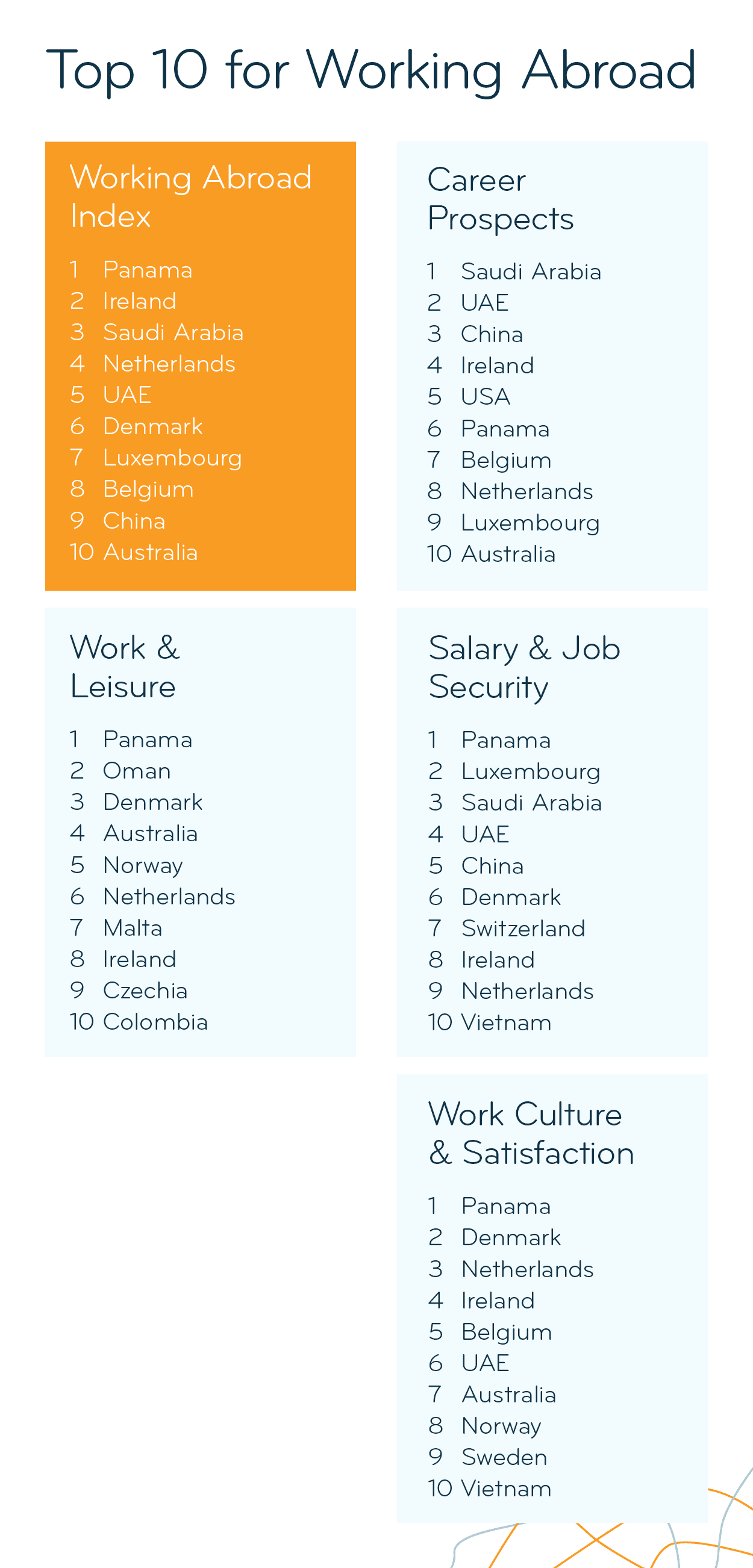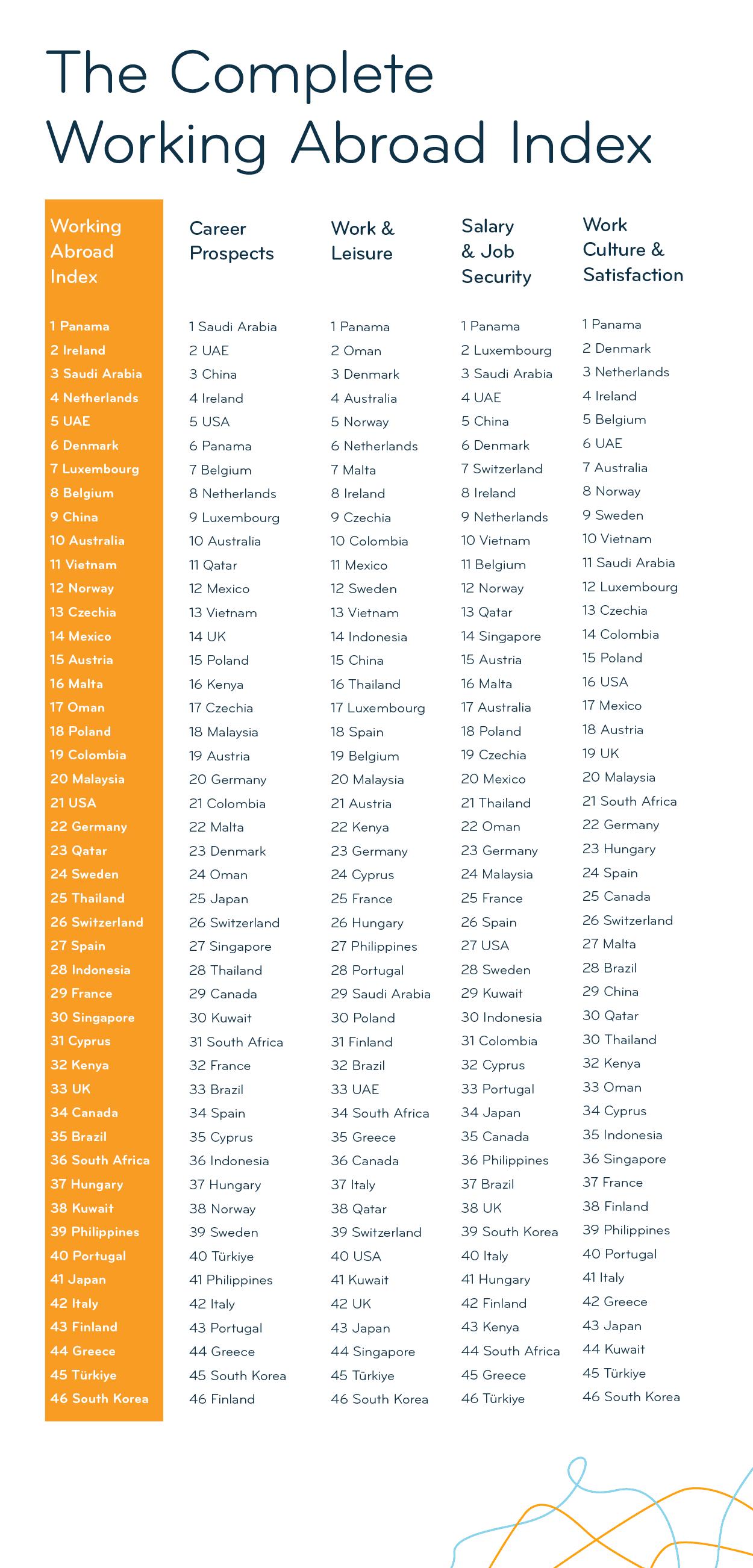
Top Prospects, Good Hours & More: Countries for Your Career
European destinations make up half of the top 10 — but the winner of the 2025 Working Abroad Index is a bit of a surprise.
- Methodology
- A Top Work–Life Balance in Panama (1st)
- Improved Career Prospects in Ireland (2nd)
- Saudi Arabia (3rd) Offers an Excellent Job Market
- No Job Satisfaction in South Korea (46th)
- A Struggling Economy in Türkiye (45th)
- Shorter Hours but Worse Prospects in Greece (44th)
- Trends in the Top 10
- Trends in the Bottom 10
- The Biggest Winners for Working Abroad
- The Biggest Losers for Working Abroad
- Full Ranking
- Further Reading
- External Resources
The Top 10

Methodology
The Working Abroad Index is based on four subcategories with two to three rating factors each.
The Work & Leisure Subcategory reflects expats’ happiness with their working hours and work–life balance.
Salary & Job Security looks at a destination’s state of the economy, the local job security, as well as whether expats feel they’re paid fairly for their work.
Expats’ general job satisfaction and how much they feel the local business culture supports flexibility (e.g., remote work, flexible hours) make up the Work Culture & Satisfaction Subcategory.
Lastly, Career Prospects considers expats’ rating of the local job market; their personal career opportunities; and if moving to the country improved their career prospects.
For a destination to be included in the index, at least 50 respondents were required. In 2025, a total of 46 countries or territories met this minimum sample size.
A Top Work–Life Balance in Panama (1st)
Following an already respectable 12th place the previous year, Panama jumps to the top in the 2025 Working Abroad Index — a result that’s particularly interesting considering how work isn’t a main motivation for expats to move to Panama in the first place. Less than one in five respondents (19%) name a job-related reason for their move (vs. 36% globally).
Instead, many originally relocated to retire there (18% vs. 3% globally), were looking for a better quality of life (10% vs. 7%), or simply enjoy living abroad (9% vs. 4%).
Still, if you are working, Panama seems the place to be! Respondents rate the country 1st for their general job satisfaction, their working hours, as well as the work–life balance. The fact that an above-average share of expats can work remotely at least some (49% vs. 45% globally) or even all the time (34% vs. 19%) might be one reason here.
Close to a quarter each work as freelancers (24% vs. 11% globally) or are business owners (22% vs. 7%).
Overall, two-thirds (67%) regard both their job security as well as personal career opportunities positively (vs. a global 54% and 52%, respectively). And an even higher share (78%) give the state of Panama’s economy a good grade (vs. 57% globally).
Improved Career Prospects in Ireland (2nd)
Like Panama, Ireland went from narrowly missing out on the top 10 in 2024 (11th) to rank an impressive 2nd in the 2025 Working Abroad Index.
Expats often work in IT (17% vs. 11% globally), healthcare (12% vs. 8%), and finance (10% vs. 7%) — and they’re more likely to work in chemical and pharmaceutical industries, too (6% vs. 2%).
The country manages a top 10 result in each of the four subcategories of the index. Expats especially praise the local job market (2nd) and their personal career opportunities (6th). Seven in ten respondents (70%) agree that moving to Ireland improved their prospects (vs. 55% globally) — 43% even agree completely (vs. 23%).


Close to three-quarters (74%) are satisfied with their working hours (vs. 61% globally). With an average full-time week of 40.4 hours, expats in Ireland work fewer hours than the global average (42.5 h).
Saudi Arabia (3rd) Offers an Excellent Job Market
Saudi Arabia completes the podium, ranking 3rd in the 2025 Working Abroad Index. That’s especially great news for the 70% of expats who moved there primarily for work-related reasons, a share that’s nearly twice the global average of 36%!
The long working hours — expats in full-time jobs spend an average 46.1 hours a week at work (vs. 42.5 h globally) — don’t delight, however, with Saudi Arabia only ranking midfield in the Work & Leisure Subcategory (29th).
But the country makes up for it with an excellent job market (1st) and state of the economy (2nd). In fact, four in five respondents (80%) agree that moving to Saudi Arabia has improved their career prospects, 54% even agree completely (vs. a respective 55% and 29%, globally).


Top fields among expats in Saudi Arabia are construction (14% vs. 3% globally), IT (9% vs. 11%), manufacturing & engineering (8% vs. 6%), as well as healthcare (8% vs. 8%).
No Job Satisfaction in South Korea (46th)
South Korea has taken a major hit when it comes to working abroad, falling from 37th place out of 53 destinations in 2024 to rank dead last in the 2025 index.
The country places in the bottom 10 for each of the four subcategories. In fact, expats rate it the worst worldwide (46th out of 46) for personal career opportunities, working hours, work–life balance, and general job satisfaction. And more than half (54%) regard the local job market negatively (vs. 33% globally).
South Korea’s economy may be a major player in Asia, but it has been battered by domestic political turmoil and tensions in global trade.1
Respondents also don’t agree they’re paid fairly for their work (46th) or that the local business culture supports flexibility (46th).


Despite all this, a job is still a notable reason for expats to move to South Korea: 45% named work-related reasons as their main motivation (vs. 36% globally), and 80% of all respondents in the country are working right now, 10 percentage points more than the global average of 70%.
A Struggling Economy in Türkiye (45th)
Expats rate the Turkish economy the worst worldwide (46th), with more than three times the global average giving it a negative rating (67% vs. 21% globally)! This is one, but certainly not the only reason for Türkiye’s second-to-last place in the 2025 Working Abroad Index (45th).


Consequently, over a third (36%) rate their personal career opportunities in Türkiye negatively (vs. 27% globally), and less than half (43%) are happy in their job (vs. 60%). The country also ranks second-to-last for working hours (45th) and expats’ work–life balance (45th).
Work is at least not a main motivation to move to Türkiye: just 31% name a job-related reason (vs. 36% globally). Instead, they’re more likely than the average to have moved there for their education (13% vs. 9% globally), because they simply enjoy living abroad (9% vs. 4%), or in search of an adventure (8% vs. 5%).
Shorter Hours but Worse Prospects in Greece (44th)
Placing 44th out of 46 destinations, Greece is the second Mediterranean destination in the bottom 3 of the 2025 Working Abroad Index. It’s the worst country in the ranking for improved prospects: close to a quarter (23%) very much disagree that the move was good for their career (vs. 11% globally).


In fact, close to half the respondents (48%) are dissatisfied with the Greek economy (vs. 21% globally), and a similar share (47%) rate the local job market negatively (vs. 33%).
Despite shorter-than-average hours — expats with a full-time job in Greece work 40.9 hours per week (vs. a global average of 42.5 hours) — respondents are dissatisfied with their working hours (40th), too. Interestingly, over a third (35%) say they work remotely all the time (vs. 19% globally). This may be related to the above-average share of freelancers and self-employed expats among respondents in Greece (26% vs. 11% globally).
Trends in the Top 10
- Panama
- Ireland
- Saudi Arabia
- The Netherlands
- UAE
- Denmark
- Luxembourg
- Belgium
- China
- Australia
In 2025, there was little change in the top 10 of the Working Abroad Index. Seven out of the ten countries already featured among the best the previous year. And while Panama (1st) and Ireland (2nd) are new to the top 10, they were pretty close in 2024, ranking 12th and 11th, respectively.
The one country that stands out is China: its 9th place in the 2025 index represents a 21-spot jump from its 30th rank in 2024! As such, it’s one of the biggest winners in the index (more on that later).
From a geographical perspective, half of the top 10 can be found in Europe: next to Ireland (2nd), there’s the Netherlands (4th), Denmark (6th), Luxembourg (7th), and Belgium (8th). All five receive good to very good results in the Salary & Job Security Subcategory, with only Belgium missing out on a top 10 placement here (11th).
The UAE in 5th place joins Saudi Arabia (3rd) in representing the Middle East among the best countries for working abroad. Both countries delight when it comes to improved career prospects (Saudi Arabia 1st, UAE 2nd) as well as the state of their respective economy (2nd and 1st, respectively). The majority of expats in Saudi Arabia (70%) and the UAE (58%) also moved there for work-related reasons, compared to 36% of respondents worldwide.
Panama (1st), China (9th), and Australia (10th), meanwhile, are the odd ones out. Like Panama, Australia delights with a good work–life balance (4th), and expats voice a high satisfaction with their job (6th). The latter is also true for China (3rd), where more than seven in ten respondents (71%) point out that moving there also improved their career prospects (vs. 55% globally).
Trends in the Bottom 10
- Hungary
- Kuwait
- The Philippines
- Portugal
- Japan
- Italy
- Finland
- Greece
- Türkiye
- South Korea
The 10 worst countries also list a few familiar faces: seven of the ten destinations received this dubious distinction in 2024, while Portugal (40th in 2025) and Hungary (37th) weren’t far behind. Only South Korea saw a larger drop, ranking last (46th) in 2025 after a 37th place in 2024.
Interestingly, European destinations make up half of the bottom 10, too. Next to Greece (44th), there’s Finland (43rd), Italy (42nd), Portugal (40th), and Hungary (37th). Greece and Italy have regularly ranked among the worst countries for working abroad in previous years, and Portugal and Hungary didn’t fare much better, either. Finland, on the other hand, only saw a major drop in the ranking in 2024 (from 5th in 2023 to 46th in 2024) — from which it hasn’t recovered.
One of the weakest areas among all five countries: the available career opportunities. Only Hungary narrowly escapes the bottom 10 for this factor. However, it’s dragged down by a second-to-last place for its economy (45th).
Also on the European continent, Türkiye (45th) once more lands in the bottom 3. As such, it has already been covered in detail above.
Next to South Korea (46th), two other Asian destinations cannot delight career-focused expats: Japan (41st) and the Philippines (39th). Expats in these countries find the local business unsupportive when it comes to flexibility (e.g., remote work) and think the local economy could be better.
However, that’s where the similarities end. While Japan ranks midfield in the Career Prospects Subcategory (25th), South Korea (45th) and the Philippines (41st) receive some of their worst results here. On the other hand, close to three-quarters of expats in the Philippines (74% vs. 57% globally) find they’re paid fairly for their work. In Japan (48%) and South Korea (42%), this share is notably below the global average.
Finally, Kuwait (38th) hasn’t seen much change. Respondents continue to appreciate the state of the economy (8th) but are dissatisfied with their work–life balance (44th) and job security (45th).
The Biggest Winners for Working Abroad
In the 2025 Working Abroad Index, several countries managed to jump up in the ranking.
After placing in the bottom 10 in 2024, Malaysia rose up 27 spots to 20th in 2025. The country sees improvements across the board, and most notably for expats’ satisfaction with their working hours (from 48th place in 2024 to 22nd in 2025). Close to two-thirds of respondents (64%) are happy with their work–life balance. In 2024, only about half (51%) said the same.
Expats’ general satisfaction with their job has notably improved (from 46th to 17th place), as has their opinion regarding personal career opportunities (from 41st to 20th). Only 4% have something negative to say about the state of Malaysia’s economy. In 2024, this share was five times as high (20% negative ratings).
In 9th place, China not only grabs a spot in the top 10 in 2025 but it’s also one of the biggest winners in the index, following a mediocre 30th place in 2024. In 2024, the country already received — and continues to receive — top 10 results for expats’ personal career opportunities, fair pay, and whether relocating to China further improved their prospects.
Results for working hours (from 40th to 10th) and job security (29th to 7th) have notably improved, though. And in 2024, only about a third (36%) rated the local job market positively. In 2025, this share increased 10 percentage points to an above average 46% (vs. 39% globally).
Rising 20 spots to rank 31st in 2025, Cyprus manages to leave behind the bottom 10 of the Working Abroad Index for the first time since 2021. Results have improved across all factors of the index, with the most notable jump for personal career opportunities. In 2024, only 27% of respondents rated this factor positively. A year later, nearly double this share (52%) are satisfied.
Similarly, respondents are much more likely to view the local job market (from 44th to 16th) and their working hours (50th to 17th) positively. Their general job satisfaction has consequently gone up: 52% of expats in Cyprus are happy with their work in 2025, compared to 39% in 2024. Though this result is still below the global average of 60%.
The Biggest Losers for Working Abroad
In 2024, Indonesia snagged a top 10 spot in the Working Abroad Index (9th). A year later, it’s the undisputed biggest loser in the Working Abroad Index, down 19 places to rank 28th. An above-average 67% of expats (vs. 60% globally) are happy with their work–life balance, but this good result is disappointing compared to 2024’s share of 79%.
Even worse: Indonesia tumbles down the ranks for personal career opportunities (from 1st to 36th!) and job security (14th to 41st). In 2024, close to three in ten respondents (29%) gave the latter point the best possible rating. In 2025, this share is down to just 5%.
Worsened career prospects are also one of the reasons for Brazil’s drop in the Working Abroad Index (from 18th to 35th in 2025). Close to a third (32%) rate them negatively in 2025 (vs. 19% in 2024), and only 37% give the local job market a good grade. This is a notable drop compared to 2024, when more than half the respondents (51%) viewed Brazil’s job market favorably.
In 2024, over three-quarters of expats in Brazil (76%) said they’re paid fairly for their work (based on the industry, their qualifications, etc.). In 2025, this share dropped to 55% of respondents. A possible consequence of these developments: expats’ overall job satisfaction dropped from 2nd place to 29th in 2025.
Full Ranking

Further Reading
- The Best & Worst Countries for Expats in 2025
- Expats in Panama Are Happiest with Their Life Abroad
- Amid a Turbulent Political Climate, South Korea Slips to the Bottom
- Türkiye’s Economic Woes Spill Over into Society
- Expat Insider 2024: Discover the Best (& Worst) Places for Your Career
External References
Advertisement
Join InterNations
The community for expats worldwide
Download

